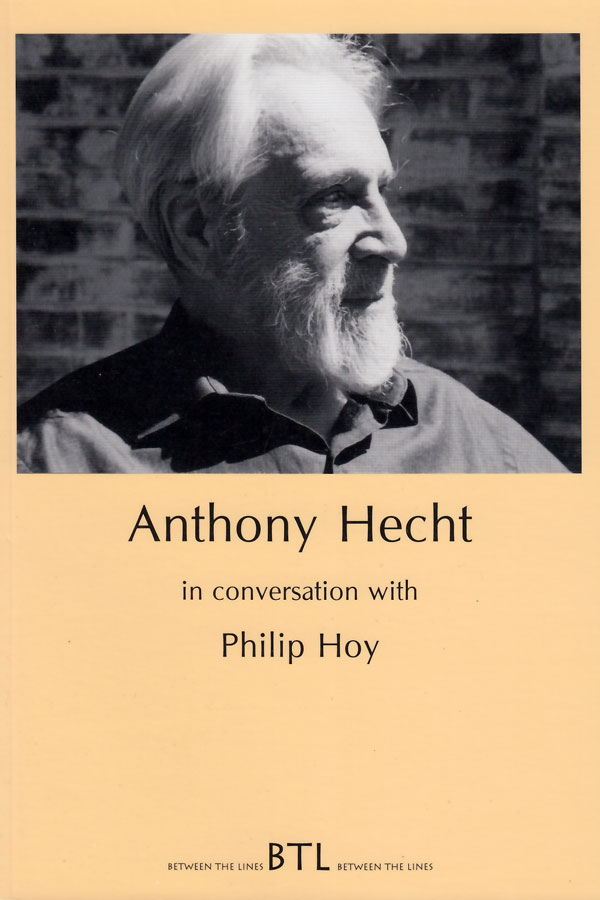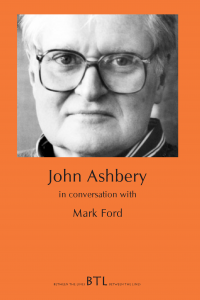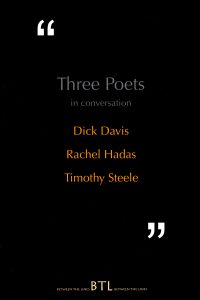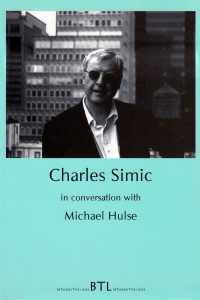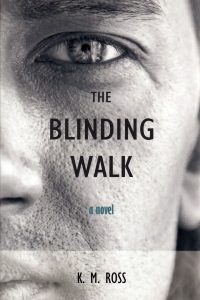Anthony Hecht in Conversation with Philip Hoy
£10.95
3rd, expanded, edition, (2nd edition: October 2001; 1st edition: June 1999).A 168 page book, featuring a 45,000 word interview, with a career sketch, a comprehensive bibliography, a representative list of quotations from Hecht’s critics and reviewers, a poem from his most recent collection, The Darkness and the Light, and (new to this, the third edition, 30+ black and white photographs of the poet, showing him at all stages of his life and career).
Between The Lines
Here are a few of the things the critics said about this book:
‘This new book from Between The Lines presents a kind of “imaginary conversation” developed from a batch of written questions mailed to the poet, and a flurry of replies, follow-up questions, and voluntary expansions – but at its heart is the plum reward of new angles from which to engage the poems …
Anthony Hecht in Conversation has the frankness and summative qualities of the best memoirs, and extends well beyond the boundaries of the average magazine interview …
[T]the questions are those of a canny and caring reader of the poetry, and the book comes across with the ease of a conversation
– an unusual one, true
– but still with the turn of talk. For this seamlessness and for the labour of the bibliography we should be grateful. And it is Hoy who raises the anecdote of the early morning taxi ride to an airport, in which Hecht, to amuse James Wright, intoned from memory all of ‘Lycidas’
– in the voice of W.C. Fields! As the excellent Between The Lines series continues … we can look forward to “fresh woods” (pause) and “pastures new”.’
– David Latane, Stand, June 2000
‘This study does shed light on much of Hecht’s work. At 118 pages, it lies somewhere between interview and memoir – perhaps the closest we will ever come to knowing Hecht. For this reason, the ‘conversation’ is all the more valuable, and will surely provide thesis fodder for decades to come … [Hoy’s] questions are polished and probing; his tone persuasive rather than insistent … [He] might just have developed a new biographical genre …’
– Heather Clark, Thumbscrew, Winter/Spring 2000
‘Until I read Philip Hoy’s remarkably detailed interview, I thought I’d understood Anthony Hecht and his work. But now we’re allowed an unprecedented intimacy. Not only is this an illuminating self-portrait by one of our great poets, but it also stands as a rare glimpse inside the poetic mind at work – a mind surprisingly vulnerable, supremely intelligent and humane.’
– J. D. McClatchy, Editor, The Yale Review
‘For nearly half a century, Anthony Hecht has been one of the few truly indispensable poets writing in English. Now we have an indispensable guide to his work, in the richest and most revealing interview he has ever conducted. Heretofore unavailable biographical detail – especially valuable in reading poems which draw from his childhood and wartime experiences – is deepened by Hecht’s meditations on poetry’s transformative, empathic task to invent people and worlds beyond autobiography.
Difficult references in the work of this erudite poet are identified and their uses clarified. Hecht offers the frankest evaluations of recent disturbing trends in criticism and education, sometimes in grave tones, sometimes with wit and mischief. Thanks to Philip Hoy’s intelligently pointed questions and Hecht’s far-ranging answers, one comes away from the conversation wishing to read or re-read all the material in the thorough bibliography that concludes the book. This little volume reminds us, in short, of why we love poetry itself.’
– Mary Jo Salter
‘A splendid addition to a splendid series. A most searching and revealing conversation.’
– X.J. Kennedy
‘Hecht has taken full advantage of the … format, crafting concise and valuable near-essays in response to a list of nearly a hundred questions posed by Philip Hoy … The detailed questioning … is felicitous, and Hecht’s responses … comprise a vividly composed autobiography that nicely outlines Hecht’s previously articulated views on matters of poetry … Impossible to summarise, this volume is a fine adjunct to Hecht’s On the Laws of the Poetic Art.
– Don Share, Essays in Criticism, October 2000
‘Disciplined, scrupulous, self-searching … The studied, protracted conduct of [his] ‘conversation’ allows Hecht to formulate his responses with great care and to quote at length from his poems and the writings of others, making his interview a full-scale apologia pro vita sua.’
– Patrick Crotty, Times Literary Supplement, October 27, 2000
1954 was quite a big year for you. You published your first collection, you won your first Guggenheim award, and you got married. Was it the Guggenheim that enabled you to give up instructing at Bard, not to resume teaching until you went to Smith, in 1956?
Yes, a Guggenheim allowed me to return to Rome for a year at the American Academy once more, where Richard Wilbur was also in residence.
Wilbur had already published The Beautiful Changes and Ceremony by that time. Did you know his work well?
Yes, I think I did. But the curious fact is that I own no copy of the first of his books, and my copy of the second is dated September, 1960. In those youthful days, knowledge of the work of new poets was something to be acquired, as it were, monthly, or at least quarterly. Everyone, myself included, read the leading ‘little magazines’, some of them very élite, and we came upon the newest and latest poems one by one as they appeared in the best and the most avant-garde of those journals. I knew Wilbur’s poems of that time entirely by their isolated periodical publications. I was an avid reader of all the earliest and most advanced of those journals, including transition, Hound and Horn, and Cyril Connolly’s Horizon, and it was in the last of these that I, an American, discovered the work of Eudora Welty. As for Wilbur’s work, I must have known it from the New Yorker, among other places, and from anthologies, such as Oscar Williams’s Little Treasury of American or Modern Poetry series. Wilbur and I had actually met at a rooftop cocktail party given by Williams in downtown Manhattan.
How did you get the job at Smith College, and what did it involve?
Let me answer the second part of your question first. I taught freshman English at Smith, and nothing else the entire time (three years) I was there. Freshman English consisted of analytical study of short-stories, a novel, and a good deal of lyric poetry. The authors we read included Henry James, D.H. Lawrence, Conrad, Chekhov, and the more or less usual catalogue of poets. Among my students was one who, by a kind of miracle, and many years later, would become my second wife. As for how I got the job, the simple truth is that I don’t remember. I suspect that what I did was what most job candidates did in those remote and simple days: I sent off applications and vitae to any place that seemed likely, either because they advertised a vacancy or because rumour (which was abundant, there being many academics in Rome and at the American Academy) led me in that direction.
Did you get to know Sylvia Plath and Ted Hughes while you were at Smith?
Yes. Sylvia was a colleague of mine at Smith College. I liked them both very much, but this was a particularly troubled and unhappy period of my life. During my three years there two sons were born, one of them during my first year. His mother got breast fever immediately after the birth, and could not nurse him, or, for that matter, do anything whatever. Consequently, I did all the shopping for food, all the cooking for my wife and myself, all the laundry, including the diapers (there were no disposable ones then), and there was no clothes-drier where we lived so that all the laundry had to be hung on lines and taken down when dry. Moreover, there was the formula for the baby to make, and all the night feedings to give, and during this time I was teaching full time. The chairman of the English department in those days, a rather self-absorbed, near-sighted martinet, upbraided me for not providing enough written comment on the papers I returned to my students. I was too dumbfounded to explain my predicament, which he should have been fully aware of in the first place, since other faculty were. In her journals, Sylvia also expressed a bewildered irritation at the fact that my wife and I never returned the hospitality she showed us. This was because my wife simply refused to entertain – in part, at least, because she couldn’t cook, and was embarrassed about it. Immediately after our second son was born she went ice-skating and broke her leg, so I had to go through the whole routine – cooking, shopping, laundry, formulas, night-feedings – all over again, and, of course, while teaching full-time as before. Still, there were a few good people at Smith while I was there, beginning with Ted and Sylvia. There was also Daniel Aaron, who became a friend later on. There was Newton Arvin, a gentle and brilliant man, and a critic of the first order, now seriously undervalued. There was Helen Bacon, a gifted classicist, with whom I was later to collaborate on a translation of Aeschylus. And of all of them, the one most dear to me, Elizabeth Drew, an English woman who wrote on modern poetry, was a friend of Auden’s, and the soul of kindness. She was fully aware of my marital plight, so there was no reason why the fidgety chairman should not have been as well. Anyway, Smith contrived profoundly to offend Ted and Sylvia in a manner that made them decide to leave after a single year. Sylvia was teaching the same courses as I, and Ted stayed at home, writing, keeping house, but fretful, with too much time on his hands. He wanted to teach too, and Sylvia arranged a meeting for him with the chairman. Ted was told they couldn’t hire him because he had no teaching experience, though this had been no barrier to their having appointed Sylvia, who had none either. But of course she was a Smith graduate. The indignation Sylvia felt about this, and which Ted probably felt as well, though he kept his feelings under better control than she, was little short of explosive. They firmly resolved to leave at the end of the year, and they did so, to the utter astonishment of the chairman, who hadn’t the slightest clue he had offended them. They settled for a year or so in Boston, where Sylvia joined Anne Sexton and George Starbuck in one of Lowell’s classes at Boston University.
Your teaching at Smith came to an end in 1959, the year you won your second Guggenheim. It was also the year in which you and your wife separated, taking your two boys with her. How did all these developments affect you? Are you the sort of person who can go on writing in the midst of great turmoil, or are you the sort who, as Kafka might have put it, needs both hands to ward off the blows?
When I’m troubled or unhappy my faculties are paralyzed and I can’t write at all. And, alas, I was unhappy virtually throughout my first marriage, which lasted five-and-a-half years, to be followed by my total separation from my children. The divorce decree required her to live within a certain distance from New York City, so that I could continue to see them regularly. But in due course she found herself engaged to a very wealthy young Belgian, and she told me, ‘Of course, you have a legal right to make me stay here; but if you do, I will be very unhappy, and if I’m unhappy, the children will be, too.’ Against such an argument I was quite powerless.
Maybe I can quote from an earlier passage in Kafka’s diaries than the one I was alluding to just now, only I’d like to hear your reaction to what he says there:
‘Have never understood how it is possible for almost everyone who writes to objectify his sufferings in the very midst of undergoing them; thus I, for example, in the midst of my unhappiness, in all likelihood with my head still smarting from unhappiness, sit down and write to someone: I am unhappy. Yes, I can even go beyond that and with as many flourishes as I have the talent for, all of which seem to have nothing to do with my unhappiness, ring simple, or contrapuntal, or a whole orchestration of changes on my theme. And it is not a lie, and it does not still my pain; it is simply a merciful surplus of strength at a moment when suffering has raked me to the bottom of my being and plainly exhausted all my strength. But then what kind of surplus is it?’
I fear that I have never been granted Kafka’s bountiful surplus of energy that he was able to call up during crises or depressions. I can think of few things more enviable. I have no reserves of imaginative energy to draw on in periods of darkness. Ransom, who proposed what might be thought of as a doctrine of ‘aesthetic distance’, which I found easy to adopt, used to say that the poet who wanted to write a love poem would be well advised not to do so in the first fine frenzy of his passion. He would be too close to his experience, too giddy with its pleasing chaos and turbulence to be able even to understand himself, let alone to put his feelings and thoughts into some disciplined order. The writer, Ransom would maintain, who can best create powerful feelings in his reader is precisely the one who has mastered these feelings before trying to set them down on paper. And Eliot would add to this that the writer can also describe and evoke experiences he’s never actually had – a matter that the stunning variety of Shakespeare’s and Dickens’s and Browning’s characters ought unarguably to demonstrate, though the tendency in our era is to regard lyric poems as purely the seismography of the life of the individual soul. Flaubert wrote to his mother in December, 1850, expressing much the same requirement of absolute personal detachment that Ransom recommends, though in Flaubert’s case, far more severely, and by way of explaining that he was determined never to marry, feeling that his vocation as a writer forbade it. He wrote, ‘You can depict wine, love, and women on the condition that you are not a drunkard, a lover, or a husband.’
That reminds me of something Pascal once said: ‘Few men speak humbly of humility, chastely of chastity, sceptically of scepticism.’
How very sound; and how chastening.
The Waywiser Press
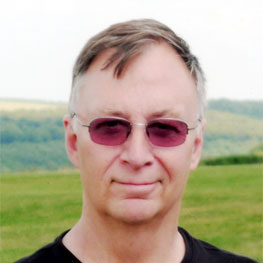 Philip Hoy was born in 1952, and educated at Glastonbury High School in Surrey, and at the Universities of York and Leeds. He has a Ph.D in Philosophy, a subject he taught for many years, in the UK, and, more recently, overseas. Since returning to the UK, in 1996, Hoy has been writing, editing and publishing. His most recent publications include “The Starry Night”: Snodgrass’s Van Gogh Reconsidered’ (Agenda, London, 1996), “The Genesis of On Certainty: Some Questions for Professors Anscombe and von Wright’ (Wittgenstein Studien, University of Passau, 1996), the proem and afterword to Peter Dale’s Da Capo (Agenda Editions, London, 1997), “The Will to Power #486/KGW VIII, 1 2[87], 2: A Knot that Won’t Unravel?” (Nietzsche Studien, Walter de Gruyter, Berlin, 1998), W.D. Snodgrass in Conversation with Philip Hoy (BTL, London, 1998), Anthony Hecht in Conversation with Philip Hoy (BTL, London, 1999, 2001, 2004), Donald Justice in Conversation with Philip Hoy (BTL, London, 2001), “The Interviewer Interviewed: N.S Thompson talks to Philip Hoy, editor of Between The Lines”, The Dark Horse, 15, Summer 2003: 40-46. (If you would like to read this article, please follow this link: http://www.waywiser-press.com/imprints/darkhorse.html).
Philip Hoy was born in 1952, and educated at Glastonbury High School in Surrey, and at the Universities of York and Leeds. He has a Ph.D in Philosophy, a subject he taught for many years, in the UK, and, more recently, overseas. Since returning to the UK, in 1996, Hoy has been writing, editing and publishing. His most recent publications include “The Starry Night”: Snodgrass’s Van Gogh Reconsidered’ (Agenda, London, 1996), “The Genesis of On Certainty: Some Questions for Professors Anscombe and von Wright’ (Wittgenstein Studien, University of Passau, 1996), the proem and afterword to Peter Dale’s Da Capo (Agenda Editions, London, 1997), “The Will to Power #486/KGW VIII, 1 2[87], 2: A Knot that Won’t Unravel?” (Nietzsche Studien, Walter de Gruyter, Berlin, 1998), W.D. Snodgrass in Conversation with Philip Hoy (BTL, London, 1998), Anthony Hecht in Conversation with Philip Hoy (BTL, London, 1999, 2001, 2004), Donald Justice in Conversation with Philip Hoy (BTL, London, 2001), “The Interviewer Interviewed: N.S Thompson talks to Philip Hoy, editor of Between The Lines”, The Dark Horse, 15, Summer 2003: 40-46. (If you would like to read this article, please follow this link: http://www.waywiser-press.com/imprints/darkhorse.html).Hoy is managing editor of Between The Lines, and executive editor too of The Waywiser Press, the press of which BTL is an imprint. He lives in Surrey.
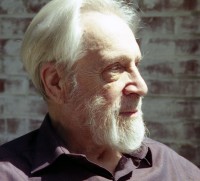 Anthony Hecht was born in New York City in 1923, the first son of Melvyn Hahlo Hecht and Dorothea Hecht (née Holzman). His brother Roger, who would also become a poet, was born two and a half years later.
Anthony Hecht was born in New York City in 1923, the first son of Melvyn Hahlo Hecht and Dorothea Hecht (née Holzman). His brother Roger, who would also become a poet, was born two and a half years later.Hecht was educated at three of New York City’s schools, and then, in 1940, enrolled as an undergraduate at Bard College, an experimental adjunct of Columbia University, situated at Annandale-on-Hudson. It was at Bard, while still a freshman, that he made up his mind to become a poet, having been introduced to the work of Wallace Stevens, T.S. Eliot, W.H. Auden, Dylan Thomas and others by an inspiring teacher called Lawrence Leighton.
WWII obliged Hecht to give up his studies before graduating. At first, it looked as though he would be assigned to do intelligence work, but the special training programme he was inducted into was cancelled at the last minute, with the result that Hecht found himself en route to Europe, and some of the bloodiest fighting of the war. Any reader curious to know why the subject of cruelty recurs so frequently in Hecht’s work need look no further than this period in his life for the explanation.
After the war was over, Hecht – whose B.A. had been awarded in absentia – took advantage of the G.I. Bill of Rights and went to Kenyon College in Ohio, where he resumed his studies, this time under the supervision of John Crowe Ransom, one of the most gifted men of letters of the day. It was Ransom who gave Hecht his first English classes to teach, thereby setting him on the path to a long and distinguished career as a professor; and it was Ransom, too, as editor of the Kenyon Review, who published some of Hecht’s earliest poems, thereby setting him on the path to an even longer and still more distinguished career as a poet.
In the fifty years since his days as a student at Kenyon, Hecht has published seventeen books of poetry, three books of criticism, and a large number of essays, reviews, discussion pieces, forewords, prefaces and introductions. He has also done acclaimed work as a translator and editor.
Hecht’s endeavours have been rewarded with a string of prestigious prizes and awards, amongst them: the Prix de Rome (1951), the Brandeis University Creative Arts Award (1965), the Pulitzer Prize for Poetry and the Russell Loines Award (1968), the Bollingen Prize in Poetry (1983), the Librex-Guggenheim Eugenio Montale Award (1984), the Harriet Monroe Award (1987), the Ruth B. Lilly Poetry Prize (1988), the Tanning Prize (1997), the Corrington Award (1997), and the Poetry Society of America’s Frost Medal (2000).
Other honours to come Hecht’s way included two Guggenheim Fellowships (1954 and 1959), The Hudson Review Fellowship (1958), two Ford Foundation Fellowships (1960 and 1968), a Rockefeller Fellowship (1967), a Fulbright Professorship in Brazil (1969), an Honorary Fellowship with the Academy of American Poets (1969), Membership of the National Institute of Arts and Letters (1979), Chancellorship (1971) and Chancellorship Emeritus (1995) of the Academy of American Poets, and Trusteeship of the American Academy in Rome (1983). He was also Consultant in Poetry to the Library of Congress in Washington D.C. (1982-1984).
As well as the B.A. he was awarded by Bard College in 1944, and the M.A. he was awarded by Columbia University in 1950, Hecht has received honorary doctorates from Bard College (1970), Georgetown University (1981), Towson State University, Maryland (1983) and the University of Rochester (1987).
Hecht has three sons, two by his first marriage, to Patricia Harris, which ended in divorce in 1961, and one by his second, to Helen D’Alessandro – the author of several renowned cookery books, and a successful interior designer – with whom he lives in Washington D.C.– Philip Hoy, 1999, revised 2001
Anthony Hecht died at his home in Washington DC on October 20th 2004

